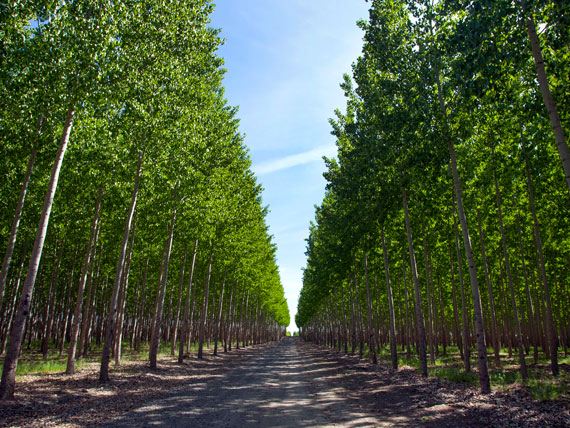Research yields a comprehensive tree and soil dataset for understanding the dynamic relationship between poplar trees and their microbial partners.
The Science
To help better understand how ecosystems work and how healthy they are, a recent data set outlined in Scientific Data connects molecular features to large ecosystem-level processes for the first time. By collecting data from 27 different poplar (Populus trichocarpa) trees, as well as the soil surrounding their roots (known as the rhizosphere), researchers hope this massive and integrated data set will help identify how different elements of the ecosystem interact and respond to changes in the environment.
The Impact
Dubbed “the” bioenergy tree, poplars are known for their genetic diversity. They hold economic value as both biofuel feedstock and their role in carbon sequestration. Poplar trees grow quickly in a variety of ecosystems and contribute to stabilizing streambanks, wildlife habitats and water-quality regulation. Focusing on the rhizosphere and interactions between the trees, microbes and soil chemistry offers insights into how these ecosystems cycle nutrients like nitrogen and carbon, as well as improving the tree’s production as a biofuel feedstock. Public accessibility to the data made available through this multidisciplinary approach allows researchers to conduct a wide variety of analyses that contribute to a sustainable bioeconomy.
Summary
The 27 samples studied by researchers came from two environments: natural forests and plantations managed through human intervention.
By leveraging metagenomics, scientists were able to analyze the DNA of microbes living around the tree roots in the rhizosphere. Metabolomics allowed them to then examine the chemicals and small molecules produced by the trees and associated microbial communities. This revealed key metabolic pathways and metabolites associated with the tree’s stress response. Finally, using transcriptomics, researchers were able to study which of the trees were turned on or off in response to its surroundings — illuminating the molecular mechanisms for adaptation within the trees.
The data set generated is 25 terabytes in size. Resources for genomic sequencing, analysis and characterization were provided by the U.S. Department of Energy (DOE) Joint Genome Institute (JGI), a DOE Office of Science User Facility located at Lawrence Berkeley National Laboratory (Berkeley Lab).
All of this information — 318 metagenomes, 98 plant transcriptomes and 314 metabolomic profiles — combined offers the global research community insights into how these trees adapt to different environments, handle stressors, and the role of microbes in mediating these processes. By harnessing the data made available through this multidisciplinary approach, researchers will be able to conduct a wide variety of analyses that can enhance our understanding of plant-microbe interactions — with potential applications in sustainable forestry and agriculture, as well as for improving the resilience of bioenergy feedstock crops.
The work builds off a longstanding partnership between the JGI and Oak Ridge National Laboratory, dating back to the first complete genome of a poplar tree in 2006.
Contact
Christopher Schadt
Oak Ridge National Laboratory
[email protected]
Funding
This research was sponsored by the U.S. Department of Energy, Office of Science, Biological and Environmental Research. Oak Ridge National Laboratory is managed by UT-Battelle, LLC, for the U.S. Department of Energy under contract DE-AC05-00OR22725. The work (https://doi.org/10.46936/10.25585/60000017) conducted by the U.S. Department of Energy Joint Genome Institute (https://ror.org/04xm1d337), a DOE Office of Science User Facility, is supported by the Office of Science of the U.S. Department of Energy operated under Contract No. DE-AC02-05CH11231. The work conducted by the National Microbiome Data Collaborative (https://ror.org/05cwx3318) is supported by the Genomic Science Program in the U.S. Department of Energy, Office of Science, Office of Biological and Environmental Research (BER) under contract numbers DE-AC02-05CH11231 (LBNL), 89233218CNA000001 (LANL), and DE-AC05-76RL01830 (PNNL).
Publication
- Schadt C. et al. An integrated metagenomic, metabolomic and transcriptomic survey of Populus across genotypes and environments. Sci Data 11, 339 (2024). doi: 10.1038/s41597-024-03069-7
